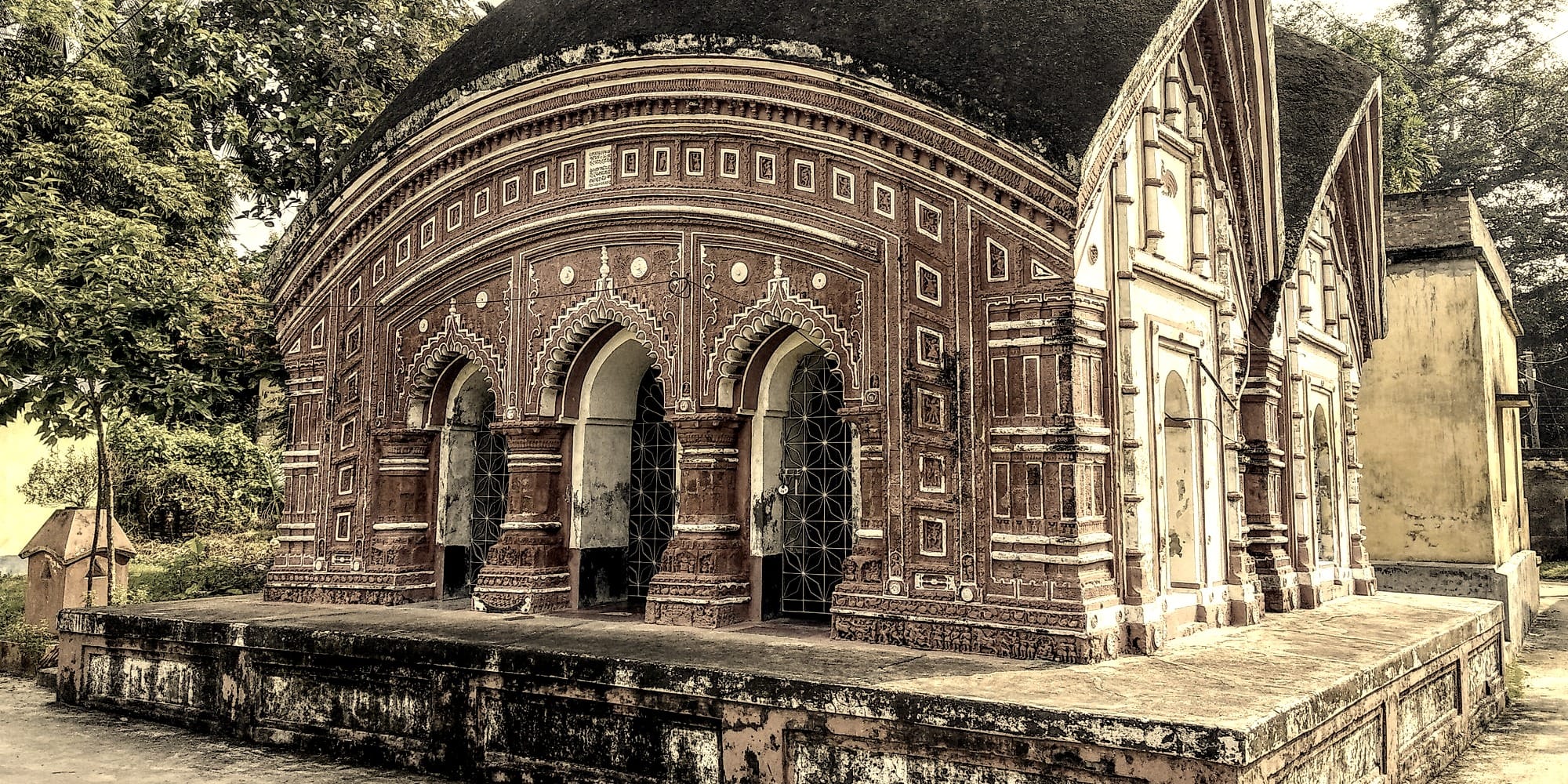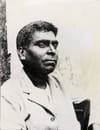Vijana-grāma – Desolated Village (1/9)

Vijana-grāma, the twenty-seven part poem that follows is at first glance a maudlin or wistful memoir, but between the lines of its innovatively disjointed couplets, the author—Śrīla Bhaktivinoda Ṭhākura, who singlehandedly revived the current of the Bhakti movement in the late 19th century—paints a portrait of his own life that is at once intimately relatable and yet subtly transcendent. From his formative childhood memories to reliving the tragic decimation of the idyllic town he grew up in, he takes readers through the full gamut of a soul coming to terms with the bittersweet reality of the world. In between his recollections, he drops hints of the insights and realizations he acquired along his arduous life path that led him to become the luminous adept we know him as today.
A near literal translation following the word order as closely as possible attempts a seamless English reading here, but dear readers, do forgive any error or omission in this publication. Attempting to heed the example of Śrīla Bhakti Prajñāna Keśava Gosvāmī Mahārāja—and already failing, for he wrote absolutely nothing to introduce this text and let it speak for itself entirely—I will wax eloquent no further, but to give the pedantic Western reader some context to the present publication, I feel compelled to include Stephan Knapp’s brief, informative review of these works:
In the year l86l, after having given up his work in the educational system, Thakura Bhaktivinoda accepted the post of a Deputy Magistrate under the government of Bengal. After some time, having noticed the corruptness of the peons, he gave up his post as a Deputy Magistrate and was offered the position of a Collectorate Officer. During this period he established an organization called the "Bhratr Samaja". In l863 he wrote an English book called “Our Wants” and at this time he constructed a home in Rana Ghata. In this same year of 1863, during his stay in Burdwan, the Thakura composed two very novel poems in Bengali. One was entitled Vijanagrama (a deserted village) and the other poem was called Sannyasa. The style of these two poems was highly praised and admired by many big literary men of that time. An article concerning these two poems appeared in the Calcutta Review of 1863, vol. 39 and runs as follows:
The Vijanagrama, the first poem in this book, is an account of the desolation of the once populous village of Ula, near Rana Ghata, in consequence of the ravages of the late epidemic. It is pleasing in style, and evidently on model of Goldsmith; and we would rather see a Bengali using his English studies to purify and improve the style of vernacular verse than find him composing imitation English epics about Porus and Alexander. […] We hope the author will continue to give his countrymen the benefit of his elegant and unassuming pen, which is quite free from those objectionable licenses of thought and expression which abound in many dramas recently published, the want of the day is the creation of a literature for Hindu ladies; and we trust that many more educated natives will have the good sense to devote their time and abilities to the attainment of this most desirable end.
The rhyme and style in which those two books were written showed a complete departure from the then existing mode of writing and they gave birth to a new way of writing poetry in the Bengali language.
—From “Srila Bhaktivinoda Thakura And His Great Accomplishments,” by Stephen Knapp.
śrī śrī guru-gaurāṅga jayataḥ
Vijana Grāma
“Desolate Village”
[Part 1/9]
(1)
সুমধুর ধ্বনি কিবা পশিলা শ্রবণে !
sumadhura dhvani kibā paśilā śravaṇe
A very sweet sound, how it entered my ears
শুনিয়া সে গ্রাম-নাম (*) আজি, আহা !
śuniyā se grāma-nāma āji, āhā! mane
Hearing that village’s name today, āhā! In my mind,
আনন্দ-লহরি প্রবাহিলা মন্দগতি,
ānanda-lahari prabāhilā manda-gati,
…a wave of bliss began to flow a sluggish pace
উত্তপ্ত বালুকোপরি যেন স্রোতস্বতী
uttapta bālukopari yena srotasvatī
Like a stream over burning sands,
মলয় পবন বহে । সুখ-পুরি, হায় !
malaya pabana bahe | sukha-puri, hāya!
…breezes from the southern sandalwood forests flow. Oh town of joy, alas!
শুনিয়া তোমার নাম অন্তর জুড়ায় !
śuniyā tomāra nāma antara juḍāya!
Hearing your name soothes my heart
কতদিন পরে শুনি সে-স্থানের নাম,
koto-dina pare śuni se-sthānera nāma,
Hearing that place’s name after so many a day
যথায় এ ক্ষুদ্র জীব আসি' এই ধাম
jathāya e kṣudra jīva āsi’ ei dhāma
Where this insignificant being came into this realm…
প্রবেশিলা কলেবরে—মম আঁখিদ্বয়
praveśilā kalebare—mana āñkhi-dvaya
Entering this corporeal form—mind and two eyes
জগতের চক্ষুসহ করিলা প্রণয়
jagatera cakṣu-saha karilā praṇaya
With which eyes this being fell in love with the world
অগ্রে । হায় ! অকস্মাৎ শুনিয়া সে-স্বর
agre | hāya! akasmāt śuniyā se-svara
First. Alas! Suddenly hearing that sound…
মধুমাখা, শিহরিলা আমার অন্তর ! !
madhumākhā, śiharilā āmāra antara!!
Like honeycomb, has thrilled my heart!!
1 The village of Ulā within the district of Navadvīpa.
(2)
কহ, ওগো সরস্বতি ! কিরূপে এ দেশ
kaha, ogo sarasvati! ki rūpe e deśa
Say, O Goddess of Wisdom, how has this country
হারাইলা সুখ সব ? অসুখ অশেষ
hārāilā sukha saba? asukha aśeṣa
…lost all joy? Unhappiness unending
এবে বিস্তারিয়া পক্ষ অতি ভয়ঙ্কর,
ebe vistāriyā pakṣa ati bhayaṅkara,
now having cast an extremely fearsome shadow,
কি কারণে আচ্ছাদিলা সুখ-দিনকর ?
ki-kāraṇe ācchādilā sukha-dinakara?
why has it covered the sun of joy?
দুঃখের কাহিনী সব করহ বর্ণন,
duḥkhera kāhinī saba karaha varṇana,
Tell all the stories of sorrow
কাঁদুক শুনিয়া যত বঙ্গবাসিগণ ।
kā̃nduka śuniyā jata baṅga-vāsi-gaṇa |
Let all the inhabitants of Bengal hear them and weep
তুমি বিনা কেবা পারে করিতে স্মরণ
tumi binā kebā pāre karite smaraṇa
Who but you can remember
অপূৰ্ব্ব বৃত্তান্ত সব,—– পূৰ্ব্ব বিবরণ ?
apūrba bṛttānta saba,—pūrba bibaraṇa?
…all those unprecedented events—the story of the East?
ভ্রমে যাহা স্মৃতি-রূপা, যেন অনাথিনী
bhrame jāhā smṛti-rūpā, jena anāthinī
That which wanders in the form of memory, like an orphan girl
ভ্রমিতেছে দেশ ছাড়ি' সদা বিদেশিনী
bhramiteche deśa chāḍi’ sadā bideśinī
She wanders, leaving her native country, forever a foreigner
হারাইয়া নিজবাস। এই ত্রিভুবনে
hārāiyā nija-bāsa | ei tribhuvane
Losing her residence. In these three worlds..
তুমি বিনা জানে কেবা, পূর্ব্বে কি কারণে
tumi binā jāne kebā, pūrbe ki kāraṇe
…who but you know why previously…
মনোহর নদী-কূলে রাখে সদাগর
manohara nadī-kūle rākhe sadāgara
On the enchanting river banks, Sadāgara kept…
পরিমাণ শীলা-খণ্ড−সুন্দর প্রস্তর!
parimāṇa śilā-khaṇḍa—sundara prastara!
Heaps of stone slabs—beautiful stone!
শোভিতে বট-বিটপী? সিন্দূরে মণ্ডিয়া
śobhite baṭa-biṭapī? sindūre maṇḍiyā
…to beautify the banyan tree? Adorned with vermilion
আহা! কি সুন্দর শোভা! রাখিলা লাইয়া
āhā! ki sundara śobhā! rākhilā laiyā
Āhā! What gorgeous splendor! He brought and installed…
তাহা বেদির উপরে জনপদ-বাসি
tāhā vedira upare jana-pada-vāsi-
…that on a throne, for the local inhabitants
গণ পূজিতে দেবীরে বর-অভিলাষী
gaṇa pūjite devīre vara-abhilāṣī
…to worship the Goddess, seeking boons
2 Son of Chand Sadagar, a rich and powerful sea merchant of Bengal.
3 Ulā-caṇḍī, the ancestral deity of Ulā-grāma.
(3)
তব শোকের তিমিরে ঢাকা, দেখে’ দুখ
tava, śokera timire ḍhākā, dekhe’ dukha-
Your, covered by the darkness of despair, seeing sorrow, sorrow’s…
কত দিন পরে আজ দেখিলাম মুখ
koto dina pare āja dekhilāma mukha
After how many days have I seen [thy] face
নদী উছলি বহিলা, যুগল নয়ন
nadī uchali’ bahilā, yugala nayana-
…river has risen and overflown, via these two eyes’…
দ্বারে, বক্ষ ভাসি’ ভুমে হইলা পতন;
dvāre, vakṣa bhāsi’ bhūme hailā patana;
…gates, drenching [my] chest, falling to the ground
দেখি তব দুরবস্থা হইলা পতন
dekhi taba durabasthā hailā patana |
Seeing your pitiful state, they have fallen
দেখি তব দুরবস্থা হইলা জাগ্রত
dekhi’ taba durabasthā haila jāgrata
Seeing your pitiful state has awakened
আমার অন্তর পনঃ বাল্য-ভাব জত
āmāra antara punaḥ bālya-bhāva jata,
In me, all the feelings of my childhood
জাহা অন্তরেতে গাঁথা ছিল এত দিন
jāhā anterete gā̃thā chila eto-dina
That which was knotted in me all these many days
প্রবাল শ্রঙখল জেন আলোক বিহীন
prabāla-śṛṅkhala jena āloka-vihīna,
Like chains of corral, bereft of light
অগাধ সলিল পূর্ব-সাগর-ভিতরে
agādha-salila pūrba-sāgara-bhitare
In the fathomless waters of the eastern ocean
লুক্কায়িত থাকে সদা | এত দিন পরে
lukkāyita thāke sadā | eto-dina pare
Hidden forever. After so many days,
দেখিয়া, জননি, পুনঃ, মলিন বদন
dekhiyā, janani, punaḥ, malina badana
Seeing, mother, again, this distressed face
তব, ভাব-সমুদয় উদিল এখন
tava, bhāva-samudaya udilā ekhona
of yours, all these feelings have risen now
জেন চিত্র-পট এক মানস-আধারে
jena citra-paṭa eka mānasa-ādhāre;
Like a painting, on the canvas of my mind
শোকানন্দ মলিলেক মনে একেবারে ||
śokānanda milileka mane ekebāre ||
Sorrow and joy mingle in my mind at once
To be continued...
